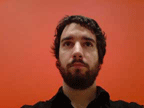Monday and Tuesday of my second week in Takoradi prove to be the most intellectually engaging thus far. The two days are filled with a workshop held by JHR expert trainers Marc and Renee. I attend, along side Jessie, Darrell and Doug, and about twenty local journalists from a wide range of media houses from across the area.
We focus primarily on the essence of journalism. Story idea generation, development of ideas through concise focus statements and writing for the ear are but a few of the topics covered. An exercise by Darrell has us deconstructing a shoe, and rebuilding it as news and current events.
Prize McApreko, former country director of Amnesty International in Ghana, and current growth and activism coordinator, gives an inspirational and in depth speech on the human rights in the nation. He talks to the current AI campaign on ending violence against women, mentioning female genital mutilation, domestic violence and the Trokosi system. Trokosi is the ritualistic enslavement of vestal virgin girls to atone for the sins of previous generations.
He talks to the issue of the death penalty, which is legal in Ghana. He says that despite a growing movement to abolish this punishment, the government will not relent. The death penalty is the punishment for treason, and in a country with a long and recent history of political coups, it stands as a severe deterrent for those who seek to take power by force.
Forced evictions and unsatisfactory resettlements are discussed. An argument on abortion, illegal in the country, focuses on the ‘what ifs’ of pregnancy following rape. The efficacy of human rights education for police, a new initiative described as a seed from which growth can occur, generates much debate. The policy of the application of ‘minimal force’ by police and the definition of what constitutes minimal gets us all thinking.
During a break in the action, I retire to the hotel lunchroom where I find a TV tuned to the BBC. On screen is a documentary on the cocoa industry in West Africa. Ghana and Cote D’Ivoire are the world’s largest cocoa producers. An older white reporter takes us into the plantations and talks to the farmers who receive very little for their crops and labour. The corporate responsibility of Nestle and other multinationals is mentioned in passing. A recently signed agreement to improve the lives of these farmers, and subsequent press conference, has gone by the wayside.
We enter a school and the presenter asks the students to raise their hand if they work at the plantation. All hands are raised. A denunciation of child labour follows, but the question of why these children work is never raised. The take home message is that all working children under 18 years of age are exploited. The fact that the compensation of a plantation worker is grossly under a family wage is not discussed. The price of cocoa is not compared to the cost of life.
The segment ends with a highly visual stunt. A cocoa farmer is given a piece of chocolate to try. He’s never eaten it before. The impoverished, uneducated farmer framed with the old, white BBC reporter. The exploited and downtrodden stands beside the enlightened and powerful. The farmer bites into the chocolate. He smiles, uncomfortably.
The reporter wraps up, calling for change in this situation, but not calling out those who can actually do something. The reporter’s work reinforces the West’s image of Africa and offers no solutions to any of the problems.
The story gives me pause. I begin to understand what the pastor and his driver were talking about during our confrontation last week. If I were in their shoes, I’d be mad as hell and not going to take it anymore, too.
A Ghana that is portrayed as an impoverished nation that exploits its children is unfair. When the context for a child who works is examined, it becomes clear that larger factors are in play. No one wants children to go uneducated. No one wants to force their child to go to work to help put food on the table. When poverty is a fact of life, the whole family has to pitch in. The problem comes in when the work is dangerous, illegal, immoral or unethical. Selling water is one thing. Selling your child’s body is quite another.
The question of why cocoa farmers in West Africa are impoverished requires more work than this reporter is willing to give. Displaying the results of this kind of inequality is easy. It’s all around the world. Raising the issue and asking questions of those with power takes courage. The systemic inequalities that exist here and elsewhere do not fit nicely into a short feature story. Unraveling this mess will take a lifetime.
Saturday, August 4, 2007
Subscribe to:
Post Comments (Atom)

1 comment:
wow!!that is so sad....its almost unbelievable!!
Post a Comment